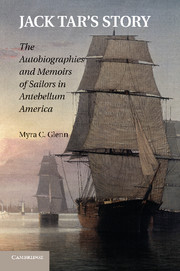Book contents
- Frontmatter
- Contents
- Acknowledgments
- List of Abbreviations
- Introduction: Why Study Antebellum Sailor Narratives
- 1 Stories of Escape, Freedom, and Captivity: Seamen Authors Recall Their Early Years
- 2 Manhood, Nationalism, and Sailor Narratives of British Captivity and the War of 1812
- 3 Exploring the Meaning of Revolution in the Americas: Sailor Narratives of the Haitian and South American Wars of Independence
- 4 Defending One's Rights as a Man and an American Citizen: Sailor Narratives as Exposés of Flogging
- 5 Straddling Conflicting Notions of Masculinity: Sailor Narratives as Stories of Roistering and Religious Conversion
- Afterword
- Appendix
- Index
2 - Manhood, Nationalism, and Sailor Narratives of British Captivity and the War of 1812
Published online by Cambridge University Press: 05 October 2010
- Frontmatter
- Contents
- Acknowledgments
- List of Abbreviations
- Introduction: Why Study Antebellum Sailor Narratives
- 1 Stories of Escape, Freedom, and Captivity: Seamen Authors Recall Their Early Years
- 2 Manhood, Nationalism, and Sailor Narratives of British Captivity and the War of 1812
- 3 Exploring the Meaning of Revolution in the Americas: Sailor Narratives of the Haitian and South American Wars of Independence
- 4 Defending One's Rights as a Man and an American Citizen: Sailor Narratives as Exposés of Flogging
- 5 Straddling Conflicting Notions of Masculinity: Sailor Narratives as Stories of Roistering and Religious Conversion
- Afterword
- Appendix
- Index
Summary
James M'Lean had an especially difficult time of it as a sailor in the late eighteenth and early nineteenth centuries. Born in Hartford County, Connecticut, he shipped off to sea when he was only ten years old in the mid-1790s. In December 1797 M'Lean was impressed by the British man-of-war Madras in Grenada. He quickly learned that producing a seaman protection certificate carried no muster with the British. Captain John Dilkes dismissed M'Lean's document, claiming: “I could get one, if I was in America, for half a crown as good as that.” When he insisted that he was an American citizen, M'Lean was called a “Scotch rascal” and threatened with the lash (168–69). Although he escaped almost a year later, M'Lean was soon impressed again. British naval records corroborate what his narrative detailed: a repeated pattern of impressments and escapes. Often the British treated M'Lean harshly, seeming to single him out for punishment because he was an American. He recalled, for example, how once when he was hauling a buoy rope a lieutenant criticized his work and hit him. “[He] knocked out two of my teeth, and cut my face shockingly, and caused much effusion of blood, saying at the same time ‘you are one of the Scoth Yankees;’ to which I replied, no I am a true born American; with that, he said, ‘no reply, you rascal! Go to your duty.’”(172).
- Type
- Chapter
- Information
- Jack Tar's StoryThe Autobiographies and Memoirs of Sailors in Antebellum America, pp. 50 - 83Publisher: Cambridge University PressPrint publication year: 2010



